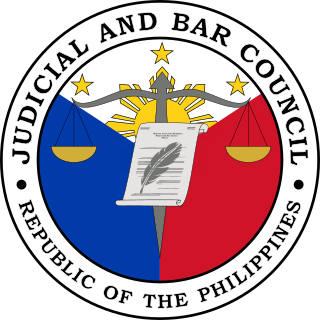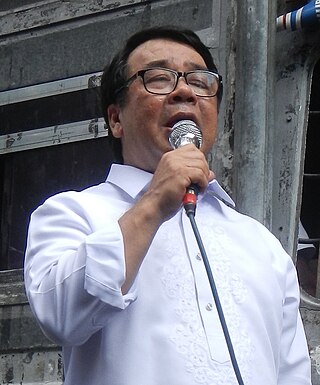Related Research Articles

The federal government of the United States is the national government of the United States, a federal republic located primarily in North America, composed of 50 states, five major self-governing territories, several island possessions, and the federal district and national capital of Washington, D.C., where most of the federal government is based.
Executive privilege is the right of the president of the United States and other members of the executive branch to maintain confidential communications under certain circumstances within the executive branch and to resist some subpoenas and other oversight by the legislative and judicial branches of government in pursuit of particular information or personnel relating to those confidential communications. The right comes into effect when revealing the information would impair governmental functions. Neither executive privilege nor the oversight power of Congress is explicitly mentioned in the United States Constitution. However, the Supreme Court of the United States has ruled that executive privilege and congressional oversight each are a consequence of the doctrine of the separation of powers, derived from the supremacy of each branch in its area of constitutional activity.

The Second EDSA Revolution, also known as the Second People Power Revolution, EDSA 2001, or EDSA II, was a political protest from January 17–20, 2001 which peacefully overthrew the government of Joseph Estrada, the thirteenth president of the Philippines. Following allegations of corruption against Estrada and his subsequent investigation by Congress, impeachment proceedings against the president were opened on January 16. The decision by several senators not to examine a letter which would purportedly prove Estrada's guilt sparked large protests at the EDSA Shrine in Metro Manila, and calls for Estrada's resignation intensified in the following days, with the Armed Forces withdrawing their support for the president on January 19. On January 20 Estrada resigned and fled Malacañang Palace with his family. He was succeeded by Vice President Gloria Macapagal Arroyo, who had been sworn into the presidency by Chief Justice Hilario Davide Jr. several hours earlier.

The vice president of the Philippines is the second-highest official in the executive branch of the Philippine government and is the first in the presidential line of succession. The vice president is directly elected by the citizens of the Philippines and is one of only two nationally elected executive officials, the other being the president.

The government of the Philippines has three interdependent branches: the legislative, executive, and judicial branches. The Philippines is governed as a unitary state under a presidential representative and democratic constitutional republic in which the president functions as both the head of state and the head of government of the country within a pluriform multi-party system.
Advice and consent is an English phrase frequently used in enacting formulae of bills and in other legal or constitutional contexts. It describes either of two situations: where a weak executive branch of a government enacts something previously approved of by the legislative branch or where the legislative branch concurs and approves something previously enacted by a strong executive branch.

Franklin Magtunao Drilon is a Filipino lawyer and former politician. He had the longest tenure in the Senate of the Philippines, having served four non-consecutive terms overall: from 1995 to 2007 and 2010 to 2022. He has served thrice as president of the Senate: in 2000, from 2001 to 2006, and from 2013 to 2016.

The Judicial and Bar Council of the Philippines is a constitutionally-created body that recommends appointees for vacancies that may arise in the composition of the Supreme Court, other lower courts, and the Legal Education Board, and in the offices of the Ombudsman, Deputy Ombudsman and the Special Prosecutor.
Constitutional reform in the Philippines, also known as charter change, refers to the political and legal processes needed to amend the current 1987 Constitution of the Philippines. Under the common interpretation of the Constitution, amendments can be proposed by one of three methods: a People's Initiative, a Constituent Assembly or a Constitutional Convention.

Renato Tereso Antonio Coronado Corona was a Filipino judge who was the 23rd chief justice of the Philippines from 2010 to 2012. He served as an associate justice after being appointed by President Gloria Macapagal Arroyo on April 9, 2002, and later as Chief Justice on May 12, 2010, upon the retirement of Chief Justice Reynato Puno.

Presbitero Jose Velasco Jr. is the incumbent Governor of Marinduque and was a former Associate Justice of the Supreme Court of the Philippines. He was appointed to the Supreme Court by President Gloria Macapagal Arroyo on March 31, 2006.

The Integrated Bar of the Philippines is the national organization of lawyers in the Philippines. It is the mandatory bar association for Filipino lawyers.
The Philippine National Broadband Network controversy involved allegations of corruption in the awarding of a US$329 million construction contract to Chinese telecommunications firm ZTE for the proposed government-managed National Broadband Network (NBN).

Neri v. Senate is a controversial 9–6 ruling of the Supreme Court of the Philippines which affirmed the invocation of executive privilege by petitioner Romulo Neri, member of the Cabinet of President Gloria Macapagal Arroyo, regarding questions asked during a Congressional inquiry on the controversial multimillion-dollar National Broadband Network (NBN) Project. The Supreme Court finally affirmed this ruling on September 4 and 23, 2008 by denying the defendant Senate Committees' first and second Motions for Reconsideration.
The Constitution of the Philippines is the constitution or the supreme law of the Republic of the Philippines. Its final draft was completed by the Constitutional Commission on October 12, 1986, and ratified by a nationwide plebiscite on February 2, 1987.

The presidency of Gloria Macapagal Arroyo, also known as the Arroyo administration, spanned nine years from January 20, 2001, to June 30, 2010. She served the remainder of her predecessor Joseph Estrada's term after he was deposed, and she was elected to a full second term in 2004 which ended in 2010. Arroyo is the daughter of 9th president Diosdado Macapagal.

The National Security Council is the principal forum of the president of the Philippines considering national security and foreign policy matters with his senior national security advisors and cabinet officials.

Neri Javier Colmenares is a Filipino legislator, human rights lawyer and activist. He was an associate of the Asian Law Centre at Melbourne Law School when he was completing his Ph.D. in law on "The Writ of Amparo and the International Criminal Court." He also lectured at the University of Melbourne on International Human Rights Law and the Rome Statute of the International Criminal Court.

The Unified Multi-Purpose ID (UMID) is a Philippine identity card that was introduced in 2010. The card was developed as a single card for the relations between several government-related agencies. The agency responsible for implementation is the Social Security System (SSS), and also the Government Service Insurance System (GSIS), the Philippine Health Insurance Corporation (PhilHealth), and the Pag-IBIG Fund use the card. The card was also suggested to be used as a voter ID.
The Philippine Truth Commission was created to find out the truth about reports of large scale graft and corruption in the previous government; to put a closure to them by the filing of the appropriate cases against those who were involved. Furthermore, to deter others from committing such crimes and to restore the people's faith and confidence in the government and in their public servants. On July 30, 2010, President Benigno Aquino III set up the Philippine Truth Commission to find out the truth about reports of large scale graft and corruption in the previous government and to put a closure to them by the filing of the appropriate cases against those who were involved. Furthermore, to prevent others from committing such crimes and to restore the people's faith and confidence in the government and in their public servants.
References
- ↑ High court rules against Arroyo gag order - Sun.Star Network Online
- ↑ Supreme Court Decision on EO464 Archived 2008-12-05 at the Wayback Machine - www.supremecourt.gov.ph
- ↑ Arroyo junks EO 464 at hotel meet [ permanent dead link ], by Roy Medina, abs-cbnNEWS.com.